RI Presidential Peacebuilding Conferences
It was the 2016 Rotary World Peace Conference where the initial seeds were planted, and our interest began in formulating and participating in a project(s) aimed at alleviating the plight of refugees and exploring how we, as Rotarians could help. We decided that several us present at the conference held in Ontario, California, would get together for a sort of round table discussion on possible methods of implementation.
At that time, the picture was much different from what today’s scenario presents as there were quite a large number of refugees coming into the US and we were simply discussing some possible ways in which we could help.
Now fast-forward to 2018. With new refugee policies in place, the number has dwindled to a trickle, and no meaningful program can be implemented here in the US.
In October 2017, I was having a meeting with some Rotarians who were discussing the expansion of a couple of youth programs, though not Rotary conceived, were having a considerable amount of success due to the support of Rotary Clubs in the district. Rotary International President Ian Risley, as we all know, called for the convening of six Rotary Presidential Peace Conferences during the first six months of the 2018 calendar year.
The first was entitled the ‘Environmental Sustainability and Peace Presidential Conference’ and was held in Vancouver, BC. The remaining five Presidential Peace Conferences were centered around Rotary’s Six Areas of Focus with Peace being the underlying theme for all the conferences, held in cities around the world.
The second such conference was the “Water, Sanitation, Hygiene and Peace Presidential Conference” and it was to be held the weekend immediately following the Vancouver conference in Beirut, Lebanon.
During this October 2017 meeting which I earlier alluded to, one of our members posed the question if there was any interested in attending the February Peace Conference in Lebanon? It was suggested that following the conference we might visit some Rotarians and Rotary Clubs to see if we could do something to help alleviate the refugee situation in Lebanon. It is a country about the size of the State of Rhode Island with a population of about four million Lebanese citizens- and almost two million Syrian and Palestinian refugees.
Alan Bazzaz, Past President of the Rotary Club of Lake Oswego, Oregon and his wife Fatma, and I decided to go to carry the mission to Lebanon. Alan has lived in the US for over 40 years but was born in Iraq and his wife was born in Beirut and both hold dual US and Iraqi citizenship. The absolute icing on the top of the cake is that both Alan and Fatma have Arabic as their first language. Their guidance during the visit made all the difference in the world, not only because of their interpretive skills, but also their understanding of the nuances that come with being native to that part of the world!
The conference in Beirut itself was good, but the real productive time, at least in this Rotarian’s point of view, was following up on the contacts we made at the conference by visiting actual Rotary Clubs and/or Rotarians for coffee or dinner, whatever the timetables allowed.
Peace Village Tripoli, Lebanon RC of Tripoli Metropolis
Approximately seventy-five miles north of Beirut on the Lebanese Coast lies the city of Tripoli, Lebanon. Tripoli is a city of about 500,000 and has several Rotary Clubs. Alan and I met with three women who are members of the Rotary Club of Tripoli Cosmopolis, a relatively small club with a few more women than men. The women we met are what you might call movers and shakers in their Rotary Club, and I wouldn’t be a bit surprised if they have the same impact in their community.
When we sat down for our first meeting, we made it clear that we were interested in partnering with them in a project of their own choosing because they know the needs of their community much better than us.
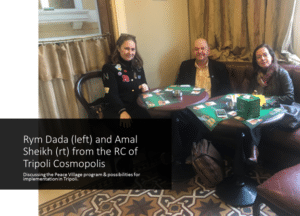
The first comment made by one of the women was that they were very concerned with the epidemic, as they saw it, of bullying in schools and would love to have a program or project whereby they could address this problem and perhaps begin the process of turning it around.
I told them about Peace Village. It is a program in our community that deals with students ages six to thirteen years. They sounded most interested in the program and so I contacted the executive directors of Peace Village Global, who are in the Portland, Oregon area. They proceeded to contact the Rotarians in Lebanon, and within a couple of weeks they indicated that they would very much like to conduct a Peace Village at a school in their city.
Upon my return from Lebanon, I found out that my home town of Newberg, Oregon, which had conducted Peace Village programs for the past five consecutive years, had decided to take a one-year hiatus from Peace Village Newberg due to administrative constraints. I immediately contacted the women in Tripoli, Lebanon who were hoping to have their very first Peace Village. I met with the Newberg Rotary Peace Committee and we agreed to ask our Club’s foundation, which had already committed $5,000 to the Newberg Peace Village, if they would divert these funds to support the inaugural Tripoli Peace Village. They agreed to do so, and we were also able to obtain $2,000 in District 5100 matching funds for scholarships for the Tripoli Peace Village participants.
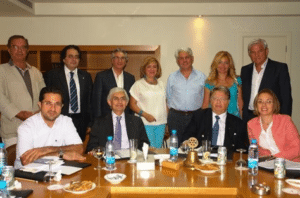
The Rotary Club of Beirut Cedars was chartered in 2010. This young, but dynamic club is among the leading clubs in Lebanon in achieving Matching and Global Grants.
Mentor Arabia RC of Beirut Cedars
Mentor Arabia http://mentorarabia.org/?lang=en is a regional branch of Mentor International https://mentorinternational.org, which includes Mentor USA. It was founded by the queen of Sweden, Silvia, in partnership with the WHO. MA’s objective is to empower children to avoid the life of drugs and violence, and choose a healthy life, life-long learning, inclusion and equality.
Mentor Arabia’s mission is mentoring youth, 17-27, on job skills and peace building through education and competition. The typical program last 6-9 months, where youth are equipped with tools to become productive and resolve problems peacefully. The combination of classroom classes, combined with field activities, culminates in a competition that tests the effectiveness of the program. The competition can be in art, such as paintings, photography, or video, or in science such as robotics. Participants are selected is a mix between local communities and Syrian refugees.
For a Global Grant of around $100K, Mentor Arabia will customize a program with emphasis on Peacebuilding and Conflict Resolution. It will select a combination of 40% Lebanese youth from various backgrounds (Muslims, Christians, Druze, etc.), and 60% Syrian refugee youth. They go through a minimum of 6 months education in mediation, conflict resolution, as well as vocation and other life skills. At the end of the training, there will be a competition on exhibiting their learning through media or art project. Beirut Cedars RC will be the host club and hope to contribute $20K to the project.
Qaraoun Project (Clay, Sand, Gravel, Crusher and Separator)
RC of Zahleh-Bekaa
Qaraoun is a small town 30km from the Syrian border of 5000 Lebanese inhabitants and over 4800 Syrian refugees. 250 of the 920 families live in tents. The rest live in houses under construction, apartments, or garages. Despite these numbers, Qaraoun has shown an immense sense of hospitality and a collective resilience that has enabled them to accommodate so many refugees peacefully and civilly. Municipalities in Lebanon are playing a more active role in the direction of the humanitarian response, security and stability problem solving, and conflict prevention and peacebuilding. They are also turning the refugee crises into an opportunity to improve the city’s infrastructure, services, and governance systems.
Due to the lack of land available to be used as a dump site for construction trash and excavated materials, people dump the refuse in scattered places. It is felt that the construction of a Clay, Sand, Gravel Separator will achieve many goals such as:
1- Close all informal dump sites
2- Create more job opportunities
3- Generate income to the municipality by reusing the recycled products
This project is in municipality land of 10,000m2. The Municipality of Qaraoun would run and maintain the project. Estimated Cost $160,000.
Recycling Center & Landfill Facility RC of Aley
The Union of Municipalities of Gharb Aala and Chahhar (UMGAC) was formed in 2011 in response to diminished capacity of the central government to provide sanitation services needed in the small communities. 14 villages in the county of Aley, state of Mt Lebanon, formed UMGAC to pool resources from village municipalities to do development projects for the communities. The estimated population in the area is approximately 47,450 Lebanese, and 10,665 Syrian refugees. After the garbage crises in 2015, the municipalities have the responsibility to deal with their own garbage. The crisis, in part, was a result of the explosion in population due to the Syrian refugees.
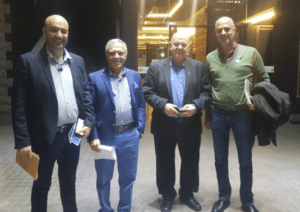
The project:
UMGAC was charged to find a way to recycle and determine appropriate landfills for non-recyclables. It opened a modest sorting facility in the village of Ainab that sorts plastic, tin/aluminum, glass and cardboard stock. It also compacts, bails, and transports to purchasers. The current facility treats roughly 20% of the total trash disposed. It also does some separation of organic material and collecting/cleaning and bailing plastic bags.
The project objective is to expand the capacity of sorting and do much of the sorting at the source. It calls for a larger compactor, a forklift, and recycling bins to be distributed to over 1000 collection points in the village of Baissour.
The UMGAC Project seeks to deal with hidden impacts of the refugee crisis.
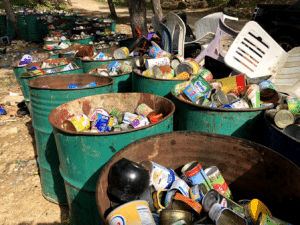
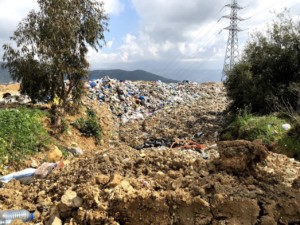
The results expected are:
– Closure of the dump site in Baissour
– Increase the use of Syrian labor
– Increase the revenue from selling the recyclables
Closure of the dump site, located on a ridge at the edge of town promises to reduce leaching into the water basin. Thousands of people in the valley rely on the water produced by snow melt in the mountains. Both Ainab and Baissour villages are located in the area of Mt. Lebanon.
We don’t know at this time how many of these proposed projects we will be able to bring to fruition, but we have been extremely impressed by the professionalism and dedication of the Lebanese Rotarians wherever we have met them throughout the country.
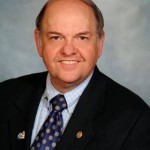
Mike Caruso is past Governor of District 5100, past RAGFP Board member, and current RAGFP member.
His ideas for creating Rotary peacebuilder clubs remain blueprints for Rotarians around the world.

Leave A Comment
You must be logged in to post a comment.